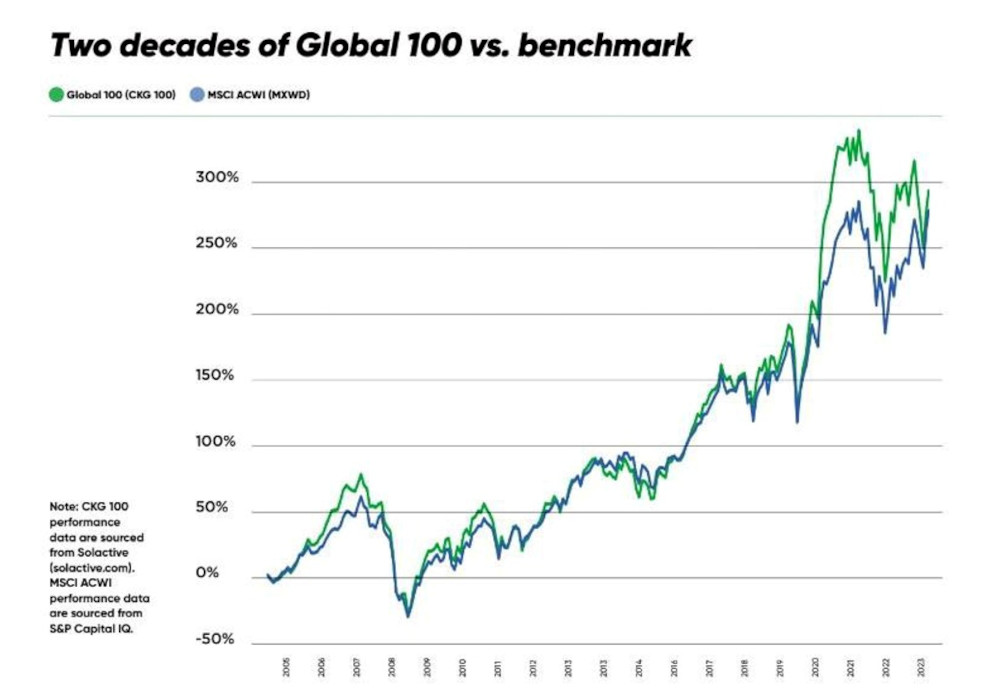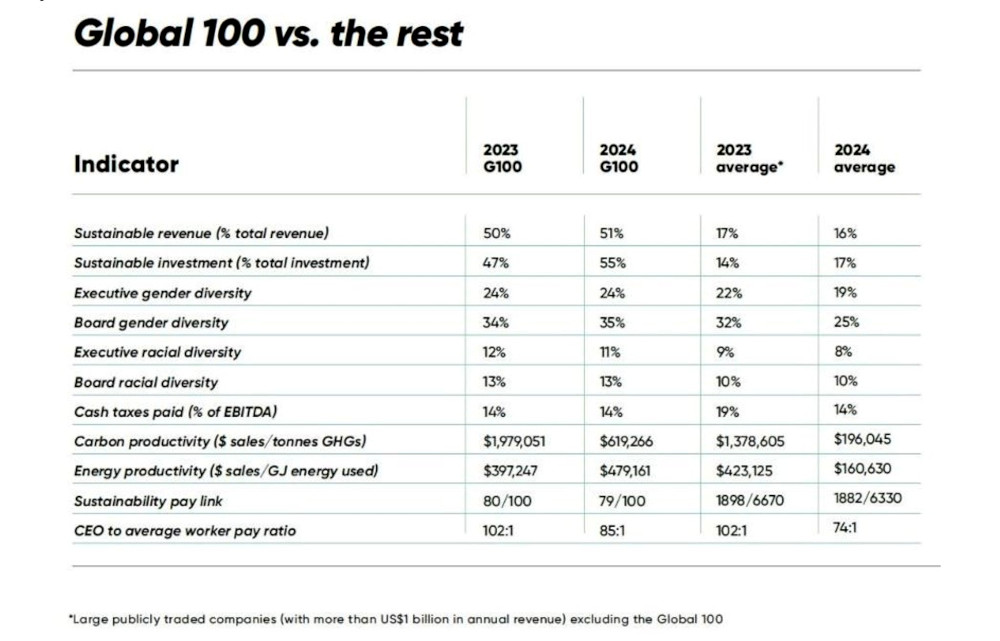The annual Global 100 ranking devised by independent media and research B
Corp Corporate Knights quantitatively
compares and ranks the world’s largest publicly traded companies — equally
emphasizing the impact of a company’s operations and its core products and
services on people and the planet. The ranking is based on a rigorous assessment
of 6,733 companies with more than US$1 billion in revenues.
As a group, Corporate Knights’ 2024 Global
100
most sustainable corporations invested 55 percent of their capital expenditures,
research and development, and acquisitions in sustainable categories — compared
to an average of 17 percent by large companies (more than $1 billion in
revenue) overall.
“The Global 100 index has outperformed over time because Global 100 companies
back up their green commitments with their investment dollars,” says Toby
Heaps, CEO of Corporate
Knights. “Sustainable investment themes like clean energy are growing
exponentially; and the Global 100, across sectors, are help ing to drive and are
poised to thrive in the low-carbon economy.”
Global 100 companies direct three times (55 percent vs 17 percent) more capital
into sustainable investments as a percent of total investments and generate
three times (51 percent vs 16 percent) more sustainable revenue as a percent of
total revenue compared to the average large company. The Global 100 Index has
also continually tracked higher total returns (net USD) since its inception in
2005, returning 295 percent (vs 278 percent for the MSCI ACWI) as of the end of
2023. This is particularly notable as the Global 100 have no exposure to weapons
or traditional fossil-fuel stocks, which have suffered from geopolitical
instability over the past two years.
This year, 106-year-old Australian scrap metal recycler Sims
Ltd emerged as 2024’s most sustainable corporation.
While its environmental track record is not
pristine,
it has made significant investments and divestitures in recent years to improve
its performance — and has set targets to transition entirely to the use of
renewable energy in its shredding and separating operations by 2025, become
carbon neutral by 2030 and achieve net-zero emissions by 2050.
Matthew Malinsky, research manager
for Corporate Knights, says the increase in sustainable investment is a welcome
sign that companies are changing course.
“The fact that these companies are plowing more money into sustainable capital
expenditure and R&D means that we expect them to have higher sustainable
revenues in the near future,” he says.
What is the Global 100?
Since 2005, the Global 100 has been one of the world’s most valued and
transparent rules-based sustainability ratings that emphasizes the impact of a
company’s core products and services. It is the best-performing global
sustainability index (ticker:
CKG100),
with more than 10 years of history. All publicly traded companies with more than
US$1 billion in revenue are assessed across 25 key
performance indicators that cover resource management, employee management,
financial management, sustainable revenue and sustainable investment, and
supplier performance. Companies engaging in “red flag” activities such as
blocking climate policy and contributing to deforestation are disqualified. Its
methodology illuminates the corporate 'say–do' gap: Corporate Knights says only those
companies making sustainable solutions a core part of their business offerings
and allocating meaningful investments to reduce their carbon footprints make the
grade.
Proving the business case for a circular economy
Malinsky says that the success of two Australian companies that top the 2024
ranking — Sims Ltd and Brambles Ltd — is emblematic
of the growing number of companies associated with a circular economy, in which
waste streams become resources or new products. Sims recycles scrap metal in 30
countries, and Brambles rents recycled shipping pallets and containers around
the globe. Both companies score 100 percent on sustainable revenue and
sustainable investment.

Corporate Knights also awarded a Global 100 “pivot prize” to Italian energy firm
ERG SpA, which completed its multiyear transition
‘from black to green’ halfway through 2023 — selling off its last fossil-fuel
asset after announcing its plans in 2013 to transition from being an oil-and-gas
to a clean-energy company.
“When we first did the Global 100 ranking 20 years ago, the ‘green economy’ was
a quaint idea,” Heaps says. “It is now the overwhelming driver of global
economic growth, and we are enthusiastic that the Global 100 will continue to
lead the way over the next 20 years and beyond.”

Get the latest insights, trends, and innovations to help position yourself at the forefront of sustainable business leadership—delivered straight to your inbox.
Sustainable Brands Staff
Published Jan 17, 2024 2pm EST / 11am PST / 7pm GMT / 8pm CET